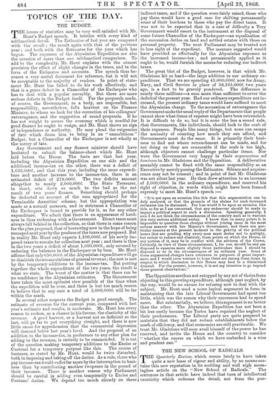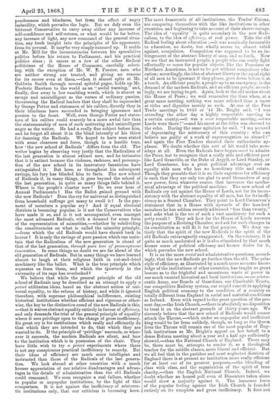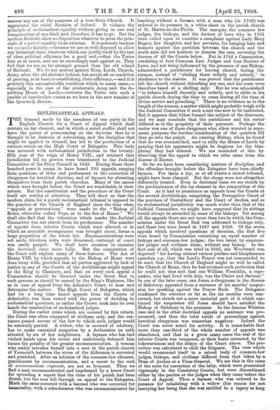THE NEW SCHOOL OF RADICALS.
THE Quarterly Review, which seems lately to have taken quite a new lease of vigour and ability, by no means sus- tains this new reputation in its scolding and well nigh mean- ingless article on the "New School of Radicals." The sentences in that article have indeed that turn of intellectual causticity which redeems the detail, not from the pur-
poselessness and blindness, but from the effect of angry imbecility, which pervades the logic. But we defy even the bitterest Conservative to carry away either any increase of self-confidence and self-esteem, or what would be far better, any increase of light, any new command of the general situa- tion, any fresh insight into the principles of his opponents, from its perusal. It maybe very simply summed up. It scolds at Mr. Mill for the inconsistencies between his speculative politics before his return to Parliament, and his practical politics since ; it sneers at a few of the other Radical politicians of the House of Commons, carefully select- ing; with the exception of Mr. W. E. Forster, men who are neither strong nor trusted, and giving no reasons for its sneers even at them,—then it almost spits at Mr. Goldwin Smith through several spiteful pages, holds up Mr. Frederic Harrison to the world as an "awful warning," and, finally, dies away in low rumbling wrath, which is almost as savage and unintelligent as the curses of ordinary passion, threatening the Radical leaders that they shall be superseded by George Potter and statesmen of his calibre, directly they in their blindness have succeeded in bringing ignorance and passion to the front. Well, even George Potter and states- men of his calibre could scarcely be a more awful fate than the statesmanship of men of such muttering and unintelligent anger as the writer. He had a really fine subject before him, and he forgot all about it in the blind intensity of his thirst for damning the Radicals. We hoped to have seen stated with some clearness and force, though in a hostile tone, how 'the new school of Radicals ' differs from the old. The writer begins by observing very justly that the Radicalism of the last generation is almost extinct now, and he intimates that it is extinct because the violence, rashness, and presump- tion of the new school in its innovatory fanaticism have extinguished it. But here, as throughout his subsequent ravings, his fury has blinded him to facts. ale new school of Radicals if, in many things, it goes beyond the school of the last generation, in quite as many things falls behind it. Where is the people's charter now? Do we ever hear of Annual Parliaments Has the Ballot gained ground with the new Radicals ? Does the cry for universal as distinguished from household suffrage get many to swell it ? Is the pay- ment of members a popular cry ? And if equal electoral districts is becoming popular, is it not the Conservatives who have made it so, and is it not accompanied, even amongst the most advanced Radicals, with a demand for some form of the representation of minorities,—whether by subdividing the constituencies on what is called the minority principle, —from which the old Radicals would have shrunk back in horror ? It is only the ravings of pure passion which can main- tain that the Radicalism of the new generation is ahead of that of the last generation, through pure love of presumptuous innovation. In some things no doubt we are far ahead of the eld generation of Radicals. But in many things we have learned almost to laugh at their religious faith in cut-and-dried machinery like the ballot. What is the true principle which separates us from them, and which the Quarterly in the extremity of its rage has overlooked • We believe that while the general principle of the old school of Radicals may be described as an attempt to apply a priori utilitarian- ideas, based on the abstract notion of uni- versal equality, to the reform of history, and while it ignored therefore, with supreme philosophical indifference, existing historical institutions whether efficient and vigorous or other- wise, the key to the distinctive creed of the new Radicals is this, —that it waives abstract equality entirely in favour of efficiency, and only demands the trial of the general principle of equality where it sees privilege open to the charge of gross inefficiency. Its great cry is for institutions which really and efficiently do that which they are intended to do, that which they are wanted to do. If the principle of 'privilege' succeeds, or wher- ever it succeeds, the modern Radicals are silent, and bow to the institution which is in possession of the chair. They have little wish to try a priori experiments where there is not any conspicuous practical inefficiency to remedy. But their ideas of efficiency are much more intelligent and instructed than those of the Radicals of the last genera- tion. We look abroad at other countries with a much keener appreciation of our relative disadvantages and advan- tages in the details of administration than the old Radicals could command. We soon recognize a real failure, whether in popular or unpopular institutions, by the light of this comparison. It is not against the inefficiency of aristocra- tic institutions only, that our criticism is becoming keen.
The most democratic of all institutions, the Trades' Unions, are comparing themselves with the like institutions in other countries, and beginning to take account of their shortcomings. The idea of equality ' is quite secondary in the now Radi- calism, to the idea of efficiency, of real power. Take the old Radical feeling about education ;—it was nominally favourable to education, no doubt, but wholly averse to, almost rabid against, compulsion. Compulsion was supposed to be an in- fringement of the abstract liberty of man, and so forth. Now we see that an instructed people, a people who can really fight effectually en masse for popular objects, like the Prussians or Northern Americans, is not to be got without compulsory edu- cation; accordingly, the idea of abstract liberty or the equal right of all men to be ignorant if they please, goes down before it at a touch. An.efficient people, a people up to an emergency, is the demand of the modern Radicals, and an efficient people, accord- ingly, we are trying to get. Again, look at the old notion about the House of Peers ; we well remember the time when, at a great mass meeting, nothing was more relished than a sneer at titles and dignities merely as such. At one of the Free Trade meetings in 1843 or '44 Mr. Bright said, "I was attending the other day a highly respectable meeting in a certain county,—it was a most respectable meeting,—two Lords were there !"—and his sneer at the titles was cheered to the echo. During the same agitation he said, "I am accused of depreciating the aristocracy of this country ; who can believe me guilty of a work of supererogation so absurd ?" and again the Free Traders shouted their enthusiastic ap- plause. We doubt whether this sort of hit would take now- adays at all. Even the Radicals have begun—not to admire the Peers, but to recognize that a really able and efficient peer like Lord Granville, or the Duke of Argyll, or Lord Stanley, or Lord Cranborne, has a great political advantage over an equally able man who has no hereditary title and estate. Though they grumble that it is so, their eagerness for efficiency is such that they are only too glad to avail themselves of any new power, from whatever source, that increases the mecha- nical advantage of the political machine. The new school of Radicals cry out against the House of Lords, not for its incon- sistency with the abstract equality of all men, but for its ineffi- ciency as a Second Chamber. They point to Lord Carnarvon's statement that in a House with upwards of five hundred members he has seldom recently addressed "less than twenty," and asks what is the use of such a vast machinery for such a petty result ? They ask how far the House of Lords answers the purpose of a Revising Chamber, and ask for such changes in its constitution as will fit it for that purpose. We deny en- tirely that the spirit of the new Radicals is the spirit of the old Radicals extravagantly exaggerated. On the contrary, it is quite as much moderated as it is also stimulated by that much keener sense of political efficiency and keener desire for it, which pervades the new school.
It is on the more social and administrative questions, accord- ingly, that the new Radicals go further than the old. The prin- ciple of efficiency, as illustrated by a much more accurate know- ledge of the institutions of other countries, has taught us great lessons as to the frightful and monstrous waste of power in our much vaunted historical and local institutions,—our aristo- cratic Army, our Boards of Guardians, our Charitable Trusts, our competitive Railway system, our stupid conceit in applying English political economy to the condition of a country so totally different from England in social and material conditions as Ireland. Even with regard to the great question of the pre- sent day,—the Irish Church, there is absolutely no disposition to treat it on the abstract grounds of thirty years ago. We sincerely believe that the new school of Radicals would sooner attack the Throne,—which under an unpopular and inefficient king would be far from unlikely, though, as long as the Queen lives the Throne will remain one of the most popular of Eng- lish institutions as Mr. Bright's appeal on her behalf to a dense Reform meeting about a year and a half ago sufficiently showed,—than the National Church of England. There may be, there must be, attempts to render it, as a theological teacher for the middle classes, more liberal and efficient. But we all feel that in the parishes and most neglected districts of England there is at present no institution more really efficient for at least one of its greatest purposes,—the blending of class with class, and the organization of the spirit of true charity,—than the English National Church. Indeed, we doubt whether an honest poll even of Dissenters taken alone would show a majority against it. The immense force of the popular feeling against the Irish Church is founded entirely on its complete and gross inefficiency. It does not answer any one of the purposes of a true State Church. It aggravates the social disunion of Ireland. It violates the principle of ecclesiastical equality without giving us one real compensation of any kind, and, therefore, it has to go. But the modern Radicals show no disposition whatever to press the prin- ciple of a priori equality to an extreme. It is precisely because we recognize history,—because we are so well-disposed to allow any historical claim whatever which can justify itself by the test of clear political efficiency for a good end,—that the Tories fear us so much, and are so exceedingly mad against us. They feel that we are on far stronger ground than the old school of Radicals. We do not protest against King, Lords, Church, Army, after the old abstract fashion, but accept all on condition of proving, or at least re-establishing, their efficiency,—and it is precisely this uncomfortable condition which in many cases,— especially in the case of the aristocratic Army and the do- nothing House of Lords,—irritates the Tories into such a jumble of inarticulate curses as we have in the new number of the Quarterly Review.




































 Previous page
Previous page